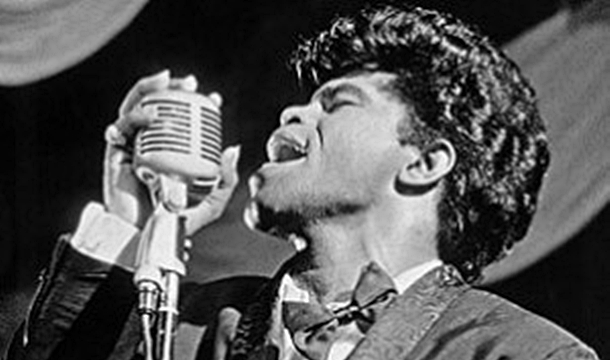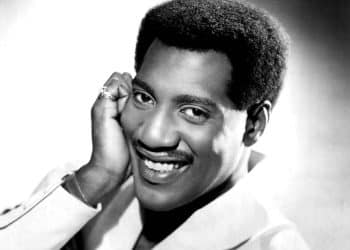Oh, dear. Brown passed away on Christmas Day in 2006, but unfortunately the legal struggles regarding his will are STILL being contested by his family.
This month, a judge will review legal documents about why each party says James Brown's "marriage" to his female companion Tomi Rae Hynie was valid or not. Hynie, is also contesting the will to fight for a share of Brown's estate, even though she was not mentioned in the will. The judge’s decision will affect whether or not Hynie will take any ownership of the estate, including Brown’s music.
In this will (which was made in 2000), Brown split his money (worth tens of millions) and property between the six children he claimed and scholarship charity fund for Georgia students in need, the state where he grew up. The will also sets aside $2 million in scholarships for his seven grandchildren and divided his personal belongings, such as costumes, between those same six children. But unfortunately, none of wishes have been carried out because a few of his adult kids have challenged the will because they want to renovate Brown’s former home into a tourists attraction, much like Elvis’ Graceland.
The will states that any heir who challenged the distribution would be disinherited…but obviously, that didn’t work! In order to rid Brown’s lawyer, accountant, and judge from getting involved with the will, some of his children and grandchildren sued to overturn the document, leaving Brown’s money in the hands of lawyers instead of when it was originally intended for.
And the tragic icing on top of this messy cake: Brown’s body hasn’t even been properly laid to rest! Originally planned to be laid to rest at his home as a memorial site, Brown’s body currently remains in a private temporary resting place.
SMH! Hopefully this will be sorted out soon so the poor man can rest in peace!
Can you believe the dispute over soul legend James Brown’s will is still ongoing?
Brown died in 2006 and his will he divided his property among the six children he recognized and charity. “The bulk of his estate, worth millions of dollars — perhaps tens of millions — was to go to a trust to provide scholarships to needy children here in his native state and in Georgia, where he grew up,” reports The New York Times.
So far nothing has been distributed because some of his children want to turn Brown’s former home into a Graceland-style attraction and have challenged the will. So has a woman he referred to as his wife, though he later contested the legality of their marriage.
So Brown’s estate sits tangled in a legal mess that includes lawsuits and millions paid in to creditors, law firms and various vendors, but not to schoolchildren or other beneficiaries. Even Brown’s body remains in a temporary resting place, not the planned memorial at his home.
When he made his will in 2000, Brown explained on an audio tape how he hoped his scholarship fund would benefit both White and Black children.
The will also set aside $2 million in scholarships for his seven grandchildren and divided his personal property, like costumes and household effects, worth perhaps another $2 million, among the six children he recognized. And any heir who challenged the distribution would be disinherited, the will directed.
But this didn’t stop the challenges, especially from those left out. Many of Brown’s children and grandchildren sued to overturn the will and to remove three longtime associates Brown had appointed as executors of the estate: his accountant, David Cannon; his personal lawyer, Albert H. Dallas; and a former judge, Alfred Bradley. Several children allege that Brown, who had had drug problems, had been influenced by lawyers and managers who stood to profit. Since then, all three executors have resigned. In fact, Cannon left due to allegations that he had misappropriated Brown’s money and was later sentenced in a separate case to three years of house confinement after being charged with breach of trust in his management of Brown’s affairs
By 2008, Henry McMaster, then the South Carolina attorney general, had stepped in. He said that Brown’s charitable initiatives had been endangered by the court challenges filed by his family.
“Under a proposed settlement with the family, he redirected a quarter of the estate’s assets to Brown’s children and grandchildren and a quarter to the singer Tommie Rae Hynie, whom Brown married in 2001 but had left out of the will,” reports the Times.
This all changed when last year the South Carolina Supreme Court threw out the attorney general’s settlement and during the past 18 months, the lower court judge to whom the case was returned, Doyet A. Early III, is still holding hearings into the matter.
Brown’s estate was estimated at $86 million, based on offers that had been made to buy the copyrights to the more than 800 songs Brown wrote or controlled and to the dozens of albums he recorded in his 50-year career. And Brown is still making money–his music generates millions of dollars in royalties for the estate annually.
Can you believe the dispute over soul legend James Brown’s will is still ongoing?
Brown died in 2006 and his will he divided his property among the six children he recognized and charity. “The bulk of his estate, worth millions of dollars — perhaps tens of millions — was to go to a trust to provide scholarships to needy children here in his native state and in Georgia, where he grew up,” reports The New York Times.
So far nothing has been distributed because some of his children want to turn Brown’s former home into a Graceland-style attraction and have challenged the will. So has a woman he referred to as his wife, though he later contested the legality of their marriage.
So Brown’s estate sits tangled in a legal mess that includes lawsuits and millions paid in to creditors, law firms and various vendors, but not to schoolchildren or other beneficiaries. Even Brown’s body remains in a temporary resting place, not the planned memorial at his home.
When he made his will in 2000, Brown explained on an audio tape how he hoped his scholarship fund would benefit both White and Black children.
The will also set aside $2 million in scholarships for his seven grandchildren and divided his personal property, like costumes and household effects, worth perhaps another $2 million, among the six children he recognized. And any heir who challenged the distribution would be disinherited, the will directed.
But this didn’t stop the challenges, especially from those left out. Many of Brown’s children and grandchildren sued to overturn the will and to remove three longtime associates Brown had appointed as executors of the estate: his accountant, David Cannon; his personal lawyer, Albert H. Dallas; and a former judge, Alfred Bradley. Several children allege that Brown, who had had drug problems, had been influenced by lawyers and managers who stood to profit. Since then, all three executors have resigned. In fact, Cannon left due to allegations that he had misappropriated Brown’s money and was later sentenced in a separate case to three years of house confinement after being charged with breach of trust in his management of Brown’s affairs
By 2008, Henry McMaster, then the South Carolina attorney general, had stepped in. He said that Brown’s charitable initiatives had been endangered by the court challenges filed by his family.
“Under a proposed settlement with the family, he redirected a quarter of the estate’s assets to Brown’s children and grandchildren and a quarter to the singer Tommie Rae Hynie, whom Brown married in 2001 but had left out of the will,” reports the Times.
This all changed when last year the South Carolina Supreme Court threw out the attorney general’s settlement and during the past 18 months, the lower court judge to whom the case was returned, Doyet A. Early III, is still holding hearings into the matter.
Brown’s estate was estimated at $86 million, based on offers that had been made to buy the copyrights to the more than 800 songs Brown wrote or controlled and to the dozens of albums he recorded in his 50-year career. And Brown is still making money–his music generates millions of dollars in royalties for the estate annually.
– See more at: http://madamenoire.com/496133/please-please-please-james-browns-will-still-tangled-legal-mess/#sthash.kAOFv0Wx.dpuf
Can you believe the dispute over soul legend James Brown’s will is still ongoing?
Brown died in 2006 and his will he divided his property among the six children he recognized and charity. “The bulk of his estate, worth millions of dollars — perhaps tens of millions — was to go to a trust to provide scholarships to needy children here in his native state and in Georgia, where he grew up,” reports The New York Times.
So far nothing has been distributed because some of his children want to turn Brown’s former home into a Graceland-style attraction and have challenged the will. So has a woman he referred to as his wife, though he later contested the legality of their marriage.
So Brown’s estate sits tangled in a legal mess that includes lawsuits and millions paid in to creditors, law firms and various vendors, but not to schoolchildren or other beneficiaries. Even Brown’s body remains in a temporary resting place, not the planned memorial at his home.
When he made his will in 2000, Brown explained on an audio tape how he hoped his scholarship fund would benefit both White and Black children.
The will also set aside $2 million in scholarships for his seven grandchildren and divided his personal property, like costumes and household effects, worth perhaps another $2 million, among the six children he recognized. And any heir who challenged the distribution would be disinherited, the will directed.
But this didn’t stop the challenges, especially from those left out. Many of Brown’s children and grandchildren sued to overturn the will and to remove three longtime associates Brown had appointed as executors of the estate: his accountant, David Cannon; his personal lawyer, Albert H. Dallas; and a former judge, Alfred Bradley. Several children allege that Brown, who had had drug problems, had been influenced by lawyers and managers who stood to profit. Since then, all three executors have resigned. In fact, Cannon left due to allegations that he had misappropriated Brown’s money and was later sentenced in a separate case to three years of house confinement after being charged with breach of trust in his management of Brown’s affairs
By 2008, Henry McMaster, then the South Carolina attorney general, had stepped in. He said that Brown’s charitable initiatives had been endangered by the court challenges filed by his family.
“Under a proposed settlement with the family, he redirected a quarter of the estate’s assets to Brown’s children and grandchildren and a quarter to the singer Tommie Rae Hynie, whom Brown married in 2001 but had left out of the will,” reports the Times.
This all changed when last year the South Carolina Supreme Court threw out the attorney general’s settlement and during the past 18 months, the lower court judge to whom the case was returned, Doyet A. Early III, is still holding hearings into the matter.
Brown’s estate was estimated at $86 million, based on offers that had been made to buy the copyrights to the more than 800 songs Brown wrote or controlled and to the dozens of albums he recorded in his 50-year career. And Brown is still making money–his music generates millions of dollars in royalties for the estate annually.
– See more at: http://madamenoire.com/496133/please-please-please-james-browns-will-still-tangled-legal-mess/#sthash.kAOFv0Wx.dpuf
Can you believe the dispute over soul legend James Brown’s will is still ongoing?
Brown died in 2006 and his will he divided his property among the six children he recognized and charity. “The bulk of his estate, worth millions of dollars — perhaps tens of millions — was to go to a trust to provide scholarships to needy children here in his native state and in Georgia, where he grew up,” reports The New York Times.
So far nothing has been distributed because some of his children want to turn Brown’s former home into a Graceland-style attraction and have challenged the will. So has a woman he referred to as his wife, though he later contested the legality of their marriage.
So Brown’s estate sits tangled in a legal mess that includes lawsuits and millions paid in to creditors, law firms and various vendors, but not to schoolchildren or other beneficiaries. Even Brown’s body remains in a temporary resting place, not the planned memorial at his home.
When he made his will in 2000, Brown explained on an audio tape how he hoped his scholarship fund would benefit both White and Black children.
The will also set aside $2 million in scholarships for his seven grandchildren and divided his personal property, like costumes and household effects, worth perhaps another $2 million, among the six children he recognized. And any heir who challenged the distribution would be disinherited, the will directed.
But this didn’t stop the challenges, especially from those left out. Many of Brown’s children and grandchildren sued to overturn the will and to remove three longtime associates Brown had appointed as executors of the estate: his accountant, David Cannon; his personal lawyer, Albert H. Dallas; and a former judge, Alfred Bradley. Several children allege that Brown, who had had drug problems, had been influenced by lawyers and managers who stood to profit. Since then, all three executors have resigned. In fact, Cannon left due to allegations that he had misappropriated Brown’s money and was later sentenced in a separate case to three years of house confinement after being charged with breach of trust in his management of Brown’s affairs
By 2008, Henry McMaster, then the South Carolina attorney general, had stepped in. He said that Brown’s charitable initiatives had been endangered by the court challenges filed by his family.
“Under a proposed settlement with the family, he redirected a quarter of the estate’s assets to Brown’s children and grandchildren and a quarter to the singer Tommie Rae Hynie, whom Brown married in 2001 but had left out of the will,” reports the Times.
This all changed when last year the South Carolina Supreme Court threw out the attorney general’s settlement and during the past 18 months, the lower court judge to whom the case was returned, Doyet A. Early III, is still holding hearings into the matter.
Brown’s estate was estimated at $86 million, based on offers that had been made to buy the copyrights to the more than 800 songs Brown wrote or controlled and to the dozens of albums he recorded in his 50-year career. And Brown is still making money–his music generates millions of dollars in royalties for the estate annually.
– See more at: http://madamenoire.com/496133/please-please-please-james-browns-will-still-tangled-legal-mess/#sthash.kAOFv0Wx.dpuf
Can you believe the dispute over soul legend James Brown’s will is still ongoing?
Brown died in 2006 and his will he divided his property among the six children he recognized and charity. “The bulk of his estate, worth millions of dollars — perhaps tens of millions — was to go to a trust to provide scholarships to needy children here in his native state and in Georgia, where he grew up,” reports The New York Times.
So far nothing has been distributed because some of his children want to turn Brown’s former home into a Graceland-style attraction and have challenged the will. So has a woman he referred to as his wife, though he later contested the legality of their marriage.
So Brown’s estate sits tangled in a legal mess that includes lawsuits and millions paid in to creditors, law firms and various vendors, but not to schoolchildren or other beneficiaries. Even Brown’s body remains in a temporary resting place, not the planned memorial at his home.
When he made his will in 2000, Brown explained on an audio tape how he hoped his scholarship fund would benefit both White and Black children.
The will also set aside $2 million in scholarships for his seven grandchildren and divided his personal property, like costumes and household effects, worth perhaps another $2 million, among the six children he recognized. And any heir who challenged the distribution would be disinherited, the will directed.
But this didn’t stop the challenges, especially from those left out. Many of Brown’s children and grandchildren sued to overturn the will and to remove three longtime associates Brown had appointed as executors of the estate: his accountant, David Cannon; his personal lawyer, Albert H. Dallas; and a former judge, Alfred Bradley. Several children allege that Brown, who had had drug problems, had been influenced by lawyers and managers who stood to profit. Since then, all three executors have resigned. In fact, Cannon left due to allegations that he had misappropriated Brown’s money and was later sentenced in a separate case to three years of house confinement after being charged with breach of trust in his management of Brown’s affairs
By 2008, Henry McMaster, then the South Carolina attorney general, had stepped in. He said that Brown’s charitable initiatives had been endangered by the court challenges filed by his family.
“Under a proposed settlement with the family, he redirected a quarter of the estate’s assets to Brown’s children and grandchildren and a quarter to the singer Tommie Rae Hynie, whom Brown married in 2001 but had left out of the will,” reports the Times.
This all changed when last year the South Carolina Supreme Court threw out the attorney general’s settlement and during the past 18 months, the lower court judge to whom the case was returned, Doyet A. Early III, is still holding hearings into the matter.
Brown’s estate was estimated at $86 million, based on offers that had been made to buy the copyrights to the more than 800 songs Brown wrote or controlled and to the dozens of albums he recorded in his 50-year career. And Brown is still making money–his music generates millions of dollars in royalties for the estate annually.
– See more at: http://madamenoire.com/496133/please-please-please-james-browns-will-still-tangled-legal-mess/#sthash.kAOFv0Wx.dpuf
Are you ready for some shocking news? Brace yourself, because the late James Brown’s estate is still embroiled in a heated legal battle. Yes, you read that right – even after all these years, the disputes over his assets are far from settled.
It’s a saga filled with drama and uncertainty that has left many fans and followers shaking their heads in disbelief. Despite his legendary status as the ‘Godfather of Soul,’ it seems that even in death, Brown cannot escape controversy. The ongoing legal battles surrounding his estate have become the stuff of legend themselves. From accusations of mishandled funds to questions about rightful beneficiaries, this case has it all.
And with no end in sight, it’s hard not to feel a sense of frustration and disappointment at how this iconic musician’s legacy continues to be tarnished by greed and discord. As we delve deeper into the complexities of this never-ending legal saga, one thing becomes clear – there are no winners here.
Instead, what remains is a cloud of shame hanging over James Brown’s estate. How did it come to this? What will be the final outcome? These questions linger in the minds of fans and observers alike as they anxiously await resolution in a case that threatens to overshadow Brown’s remarkable contributions to music history.
Ongoing Legal Battles
Don’t you want to know why James Brown’s estate is still being contested? Well, let me tell you.
It all started after his death in 2006 when multiple individuals came forward claiming to be his rightful heirs. This led to a series of legal battles that have been ongoing for years.
One of the main reasons for the ongoing contestation is the lack of a clear and valid will left by James Brown. Without a proper will, it becomes difficult to determine who should inherit his assets and how they should be distributed. This has opened up the opportunity for various individuals, including Brown’s children and other relatives, to make their claims and fight for what they believe is rightfully theirs.
Another factor contributing to the continued legal battles is the complexity of James Brown’s estate. As a legendary musician with numerous successful albums and business ventures, his estate holds significant value. With such high stakes involved, it’s no wonder that different parties are vying for control over his assets, leading to prolonged disputes in court.
Overall, it is unfortunate that James Brown’s estate is still being contested even after so many years. The absence of a valid will and the complexity of his assets have created an environment ripe for legal battles among potential heirs. Hopefully, these ongoing disputes can be resolved soon so that the legacy of the Godfather of Soul can finally rest in peace.
Disputes over Asset Distribution
Despite ongoing disputes, the distribution of assets remains unresolved in the case of James Brown’s estate. You might think that after all this time, a resolution would have been reached, but unfortunately, that’s not the case.
The late singer’s estate continues to be contested by various parties, each claiming their rightful share. One of the main points of contention revolves around Brown’s music royalties and licensing rights. With his extensive catalog and continued popularity, these assets hold significant value. However, determining who should receive what portion has proven to be a difficult task.
Family members, business associates, and even former spouses are all vying for a piece of the pie. Another area of dispute is the ownership of Brown’s personal belongings and real estate properties. From his iconic stage costumes to valuable memorabilia, there are many valuable items at stake. Additionally, numerous properties owned by Brown are still under contention. These disputes further delay any potential resolution and prolong the legal battle surrounding his estate.
Despite ongoing legal battles surrounding James Brown’s estate, asset distribution remains unresolved. The conflicts over music royalties and licensing rights as well as ownership of personal belongings and real estate continue to hinder progress in settling the matter. As time goes on, it becomes increasingly evident that reaching an agreement will require significant effort from all parties involved.
Conclusion
So, there you have it. Despite James Brown’s passing many years ago, his estate is still embroiled in ongoing legal battles and disputes over asset distribution.
It seems that even in death, the legendary musician cannot find peace.
The shame of it all is that this prolonged contestation of his estate tarnishes the legacy of a man who brought so much joy to millions through his music.
It’s disheartening to think that instead of celebrating his contributions to the world, we are left with a bitter dispute over money and possessions.
Let us hope that someday soon, a resolution can be reached and James Brown’s estate can finally find closure.






